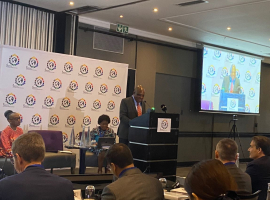
The Minister of Health, Dr Joe Phaahla, has called on experts and industry leaders to ensure that future medical countermeasures (MCMs) platforms deliver life-saving tools to the right people at the right time and place.
“Achieving this means protecting lives and livelihoods, advancing economies, and securing world peace and health security,” he said on Thursday.
The Minister was speaking in Sandton, where South Africa and Norway, in association with the World Health Organisation (WHO), are hosting a two-day high-level technical meeting on MCMs.
MCMs are medicines and medical supplies that can be used to diagnose, prevent and treat diseases and these include vaccines, diagnostics and therapeutics.
“The stakes are high, but we are confident that this initiative is in the world’s most capable and expert hands. The meeting of the world’s best minds in medical countermeasures and pandemic management excites me. There is no doubt that this will be a fascinating and highly fruitful meeting,” said Phaahla.
The discussion centres on an assessment of the needs relevant to the establishment of a future MCMs platform and an end-to-end medical countermeasure ecosystem. It also zooms in on coordinated delivery support for vulnerable countries, and humanitarian settings and financing.
Phaahla also made a special mention of the Facilitation Council for the Access to COVID-19 Tools (ACT) Accelerator, the first global pandemic response platform that raised about US$24 billion in less than two years.
The platform also deployed almost 1.9 billion doses of vaccines globally, of which more than 70% went to low-income countries. Moreover, it delivered 164 million tests, and provided treatments and oxygen supplies during the peak of the deadly pandemic.
Phaahla believes that ACT-Accelerator should remain in place until a permanent global countermeasure mechanism is in place within a broader system for global pandemic preparedness and response.
“The following two days should reflect on our performance in delivering equity in access to medical countermeasures. We have gathered to confront this issue as an acknowledgement that we came short in this regard.”
However, the Minister believes that it takes maturity, vision and excellence to strive for better future regimes towards an ideal world.
“This is an undertaking we have all made, as we committed in various fora to the Sustainable Development Goals.”
WHO Regional Director for Africa, Dr Matshidiso Moeti, said she hopes that the industry leaders will use the tough lessons of the response to the COVID-19 pandemic to inform suggestions on how to deal with future outbreaks.
“Africa was seriously affected by COVID-19 and is often the last continent to benefit from countermeasures,” said Moeti.
In addition, Special Advisor to President Cyril Ramaphosa, Professor Olive Shisana, said the COVID-19 pandemic has had a significant challenge for the international community, particularly in developing, distributing and financing MCMs.
Shisana acknowledged that the pandemic has highlighted inequalities in access to healthcare, which ultimately cost more lives. She called on the global community to do more.
Phaahla said the broad and complex issues of equity regarding access to pharmaceuticals hasve a long history, and there are "signs that threaten to cast long shadows into the future".
"However, an awakening has begun and today, we will never again accept inequity in access to quality medical countermeasures.”
He also thanked the rest of the co-hosts and collaborators who have come together to respond to an urgent need for global MCMs.
These include ACT-Accelerator, the African Union, the European Union, Japan, India, the United States and the ACT-A Independent Evaluations Reference Group comprising, which includes Brazil, Canada, Germany, India, Nigeria, Sweden, and the representatives of the ACT-Accelerator Civil Society Organisations platform. – SAnews.gov.za


